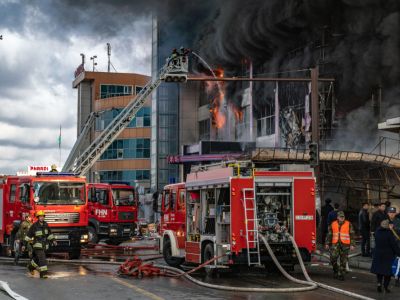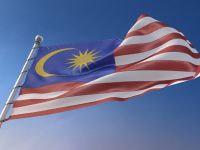Afghanistan's ruling Taliban Saturday accused the United States of sabotaging a deal to avert war after Washington warned the Islamic militia it was on a path to self-destruction.
A Taliban spokesman told AFP that the regime had no option but to prepare for war after US President George W. Bush brushed aside a resolution of Afghan Islamic clerics recommending that Osama bin Laden leave the country.
The resolution, adopted on Thursday, suggested that the Taliban leadership persuade Bin Laden, who is suspected of involvement in the September 11 terror attacks on the United States, to leave Afghanistan voluntarily.
But within hours Bush said that it did not go far enough to halt accelerating US preparations for war and demanded Bin Laden be handed over immediately.
The message was emphatically reiterated on Friday by Bush's spokesman Ari Fleischer. "If they harbor terrorists, the president's message is clear: We will defeat you," he said.
Bush, he added, had "made it abundantly clear that this nation is preparing for war, because war has been declared against the United States".
The White House spokesman warned the Taliban it was on a course towards "self-destruction" as US ground, air and sea forces deployed to within striking distance of Afghanistan.
Abdul Hai Mutmaen, a spokesman for the Taliban's supreme leader Mullah Mohammad Omar, said the US stance had left no room for negotiation.
"If Osama leaves of his own accord, nobody will stop him. But handing him over to the United States is impossible because the ulema [scholars] said that would be unislamic," the spokesman told AFP.
"The suggestion about persuading Osama to leave Afghanistan has been almost kicked out by the United States," he said. "The US president has called the resolution insufficient and now we are more considering the jihad [holy war] option."
The US has demanded that the Taliban hand over Bin Laden and close down terrorist bases in the country.
The Taliban insists it will not extradite Bin Laden to the United States but says it has not ruled out a trial in a third country if it receives concrete proof of Bin Laden's involvement in terrorism.
Bin Laden has been indicted in New York in connection with the 1998 bombing of two US embassies in Africa. US Secretary of State Colin Powell said Friday Washington had enough proof to try Bin Laden for involvement in last week's attacks on New York and Washington.
The Saudi-born militant has been based in or around the Taliban's stronghold in the southern city of Kandahar since 1996. But his whereabouts is now a mystery and there has been speculation that he may already have slipped out of Afghanistan.
Taliban Foreign Minister Wakil Ahmed Mutawakel however implied Saturday that he had not left. "I have not heard any report that he has left Afghanistan," he told AFP.
The foreign minister also issued a fresh appeal to the United States not to attack.
"Blaming the whole nation for the wrongdoing of a few people who have not even been proved guilty is not good.
"If the US attacks Afghanistan we will have no option but to pursue jihad," he said.
The Taliban's international isolation increased Saturday when the United Arab Emirates bowed to intense US pressure and cut its ties to Kabul.
Only Saudi Arabia and Pakistan, which said it would maintain its links, now recognize the regime which controls 90 percent of Afghanistan's territory.
With fears of a humanitarian catastrophe in Afghanistan mounting, international aid and human rights organizations are increasing the pressure on Afghanistan's neighbors to open their borders to hordes of refugees fleeing the prospect of war and starvation at home.
All six countries bordering Afghanistan -- China, Iran, Pakistan, Tajikistan, Turkmenistan and Uzbekistan -- have officially closed their frontiers, some before the current crisis began.
With Iran and Pakistan bracing for an influx of up to 1.5 million Afghans, aid organisations say there will have to be a massive international effort to avoid a tragedy of devastating proportions.
"This is not a job that can be handled by one single agency and one single country," said the UN refugee agency's spokesman in Pakistan, Yusuf Hassan.
"What is required is an international humanitarian coalition to provide funding and logistical support, flying in food, shelter, cooking fuel and medical supplies," Hassan said.
In the Jalozai refugee camp near the Khyber Pass on Pakistan's border with Afghanistan, refugees say the feared catastrophe is already a reality.
"Everyday I think it cannot get worse, but it does," said Mohammad Azim, who has lost his wife and two children and whose home in the Tagab valley northeast of Kabul has been destroyed four times -- KABUL (AFP)
© 2001 Al Bawaba (www.albawaba.com)









